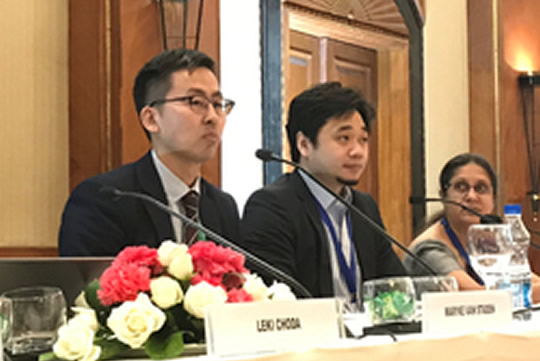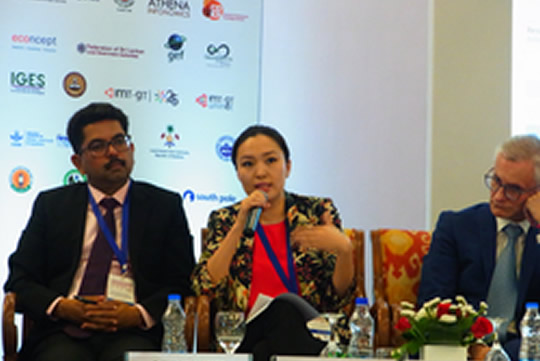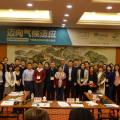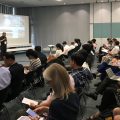RCAP2019 sets strong stage towards climate resilient actions

The 4th Resilient Cities Asia Pacific 2019 (RCAP2019) Congress was successfully organized by ICLEI and hosted by the South Delhi Municipal Corporation on 15-17 April in New Delhi, India. ICLEI East Asia supported representatives from the East Asian region to actively participate and share their works at the Congress.
Main topics covered in RCAP2019 include localization of global frameworks; capacity building and peer learning on climate knowledge and urban resilience; participatory governance and inclusive co-creative local level projects – multi-stakeholder involvement in resilience planning and action; nature-based adaptation; and financing urban resilience.
“We need to change our development paradigm and aim for climate-resilient development, moving away from traditional metrics of measuring development. The new urban infrastructure should be low-carbon, green, and climate-resilient,” said Shri M. Venkaiah Naidu, the Honorable Vice President of India, as he urged cities to strive towards adopting multi-dimensional and innovative approaches.
“With the Paris agreement in place as well as through the 2030 Agenda for Sustainable Development and the SDGs, local and regional governments have now a central role as partners to nations to achieve the targets set by the international community. They can set their own complementary commitments to make cities inclusive, safe, resilient, and sustainable,” said Gino van Begin, ICLEI Secretary General, in the opening speech.
The three-day RCAP2019 was composed of 8 plenary sessions and 7 parallel sessions, gathering over 200 participants from 90 local governments of over 25 countries to provide a platform for multi-stakeholder discussion and peer learning on the opportunities and mechanisms of implementing the Sustainable Development Goals (SDGs) and the Nationally Determined Contributions (NDCs).
Low Emission Development
During the session of low emission development strategies in the Asian region, Hongxing Xie, Director of the Bluetech Clean Air Alliance, highlighted the great steps forward that major Chinese cities have made on air pollution over the past five years, leveraging issues in the local context. With Beijing as an example, Xie suggested that air quality could be a strong driver for low carbon schemes in many developing countries, especially those that are facing air pollution challenges.
On the other hand, Jambaa Lkhagva, Director of the Energy Market Research and Cooperation Division, Energy Regulatory Commission of Mongolia, shared the country’s progress and ambitions regarding low emissions development. With half of the country’s population residing in the capital city Ulaanbaatar, where the weather condition is harsh, the city’s energy consumption contributes to around 50% of the total amount of emissions in Mongolia. However, as a small country, Mongolia has managed to take action fast in realizing its INDC target, which will be a 14% reduction in total national GHG emissions excluding land use, land-use change, and forestry by 2030.

Jambaa Lkhagva of the Energy Regulatory Commission of Mongolia (left) and
Hongxing Xie of the Bluetech Clean Air Alliance, China, shared their local low emissions development actions.
Nature-Based Adaptation Solutions
A session dedicated to nature-based adaptation solutions focused on how biodiversity could be integrated into urban design and infrastructure development. Ingrid Coetzee, Senior Manager of ICLEI Africa presented the CitiesWithNature initiative and suggested that cities need tools to make arguments for investment in urban nature. “Spatializing ecosystem services provides an inspiring and tangible mechanism to simulate appreciation and motivation for the benefits of urban nature,” said Ernita Flynn, Senior Professional Officer, ICLEI Africa.
Financing Urban Resilience
To improve access to financing urban resilience, cities should be supported in designing and planning for integrated, feasible, and bankable environment-related projects. Building on the plenary discussion about creating robust knowledge and finance mechanisms, Zolzaya Enkthur, Climate Change and Project Management Specialist of the Asian Development Bank and Founder of Climate Campaign NGO, Mongolia, highlighted the importance of monitoring and evaluating city-led environmental strategies. “As cities prepare to improve capacities in accessing financing mechanisms, they should also ensure that they have prioritized the sectors that they want to address, and create monitoring systems to track progress” Enkthur reminded.

Zolzaya Enkthur of ADB and Climate Campaign NGO, Mongolia, highlighted the importance of
monitoring and evaluating city-led environmental strategies.
The Way Forward
As the outcome of RCAP2019, local governments and participants jointly announced the New Delhi Call for Action, which reinforces commitments towards the implementation of the Paris Agreement, integrated with the SDGs, the Sendai Framework, and the New Urban Agenda, by supporting innovative and effective solutions that build resilience to climate change at the sub-national level in the Asia-Pacific region.
Dialogue and discussion developed during RCAP2019 will be brought to the Resilient Cities 2019 in Bonn, 26-28 June, which is the leading platform for local governments, the private sector, international organizations, and academia to discuss the latest developments in urban resilience and adaptation.
On this occasion, Emani Kumar, Deputy Secretary General of ICLEI, also announced and congratulated the 16 nominated members of the Asia LEDS Partnership Steering Committee 2019-2021, who will lead the voluntary regional network in designing, promoting, and/or implementing low-emissions development strategies in Asia.




